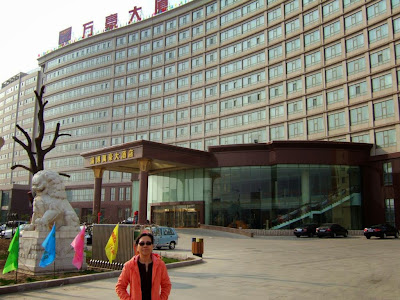
During Spring Autumn Warring Period of China at 8th to 3rd B.C., two important state empires were situated within Shandong Province. Qi at north of Tai Mountain covered big area, almost circled up Lu which was at the foot of Tai Mountain ranges. Linzi of Zibo City was the capital of Qi Empire for about 800 years.


Front and side view of The ruin museum of the capital of Qi State which was the top ten special model museums in China. Flat appearance with greenish grey bricks look like an ancient castle. The building was further up-brought by the bright peony flowers blossomed along the entrance way.


The wood-made original word of Qi 齐 and the progressive evolution of the word and their volume scale by using 4 items as their basic measurement.


The unique Tripod wine containers.


Illustration of stone era and how the Qi-emperors making sacrifices to Heavenly God.


Reeling and staggering through small lane into the undeveloped village to eye witness the existence of 600 sacrificial horses tomb at its actual location. The 600 sacrificial horses tomb of Qi 25th Duke Qijing Gong unearthed at Linzi and the 32 sacrificial horses with 10 carts of warring period unearthed in 1990 while constructing the highway, were a great archaeological discovery in Zibo 淄博 of Shandong Province.



Zibo has developed into a modern city with extremely wide and broad streets all round.


Days Hotel in Zibo was the best 5-star hotel I accommodated in my entire journey. A vigorous outlook with handsome fascinating interior style, is a distinguished building at this ancient city.



The golden ancient money displayed at the Lobby Hall is rather attractive.



Top view of Zibo City, a dense populated modern city of Shandong and its morning market.



Fresh vegetables of all kinds plus varieties of pickles were sold at one of the local market.



Zibo produced a lot of millet and wheat and also supply big volume of seasonal vegetables in all periods by applying high technology farming scheme to protect the plants from severe weather.





No comments:
Post a Comment